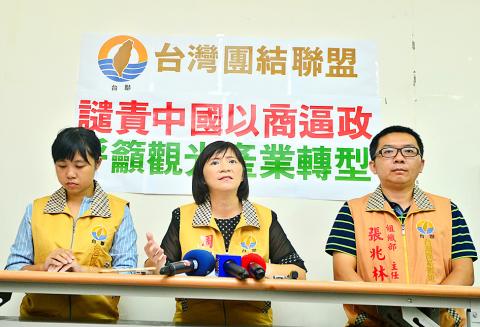Taiwan Solidarity Union (TSU) members yesterday condemned China for manipulating the tourism market in a bid to coerce Taiwan ahead of a planned protest by travel operators today, saying the tourism industry needs to reform and break away from overdependence on China.
China has restricted tourism to Taiwan as the Democratic Progressive Party (DPP) administration refuses to accept the so-called “1992 consensus,” which is part of China’s attempt to annex Taiwan by economic coercion, TSU Youth Department deputy director Hsu Ya-chi (許亞齊) said.
The “1992 consensus,” a term former Mainland Affairs Council chairman Su Chi (蘇起) admitted making up in 2000, refers to a tacit understanding between the Chinese Nationalist Party (KMT) and the Chinese government that both sides of the Taiwan Strait acknowledge there is “one China,” with each side having its own interpretation of what “China” means.

Photo: Wang Yi-sung, Taipei Times
“Taiwan’s tourism industry, as well as other industries, has to diversify its client base and seek international customers to escape overreliance on the Chinese market and hostile political manipulation,” Hsu said.
Former president Ma Ying-jeou’s (馬英九) China-friendly administration focused the nation’s economy on the Chinese market, and the tourism industry has ended up in a vicious cycle of depleting limited tourism resources to court low-spending Chinese tourist groups, former TSU legislator Chou Ni-an (周倪安) said.
The number of inbound tourists has grown by about 1 million every year and it reached 10 million last year, while Chinese tourists increased from 22.95 percent of all foreign travelers in 2008 to 53.23 percent last year, Chou said.
However, the average daily consumption per tourist has dropped alongside the increase in Chinese tourists, going down from US$224.07 in 2013 to US$207.87 last year.
“Far from benefiting from increased Chinese tourist numbers, the nation is entrenched in a tourism pattern that offers low-quality and low-profit package tours to Chinese visitors,” Chou said.
Travel agencies funded with Chinese capital that provide one-stop services should be barred from receiving relief loans from the Executive Yuan, she said.
The Executive Yuan on Thursday last week approved a plan to extend NT$30 billion (US$948.45 million) in loans to the tourism sector amid the drastic decrease in the number of Chinese tourists visiting Taiwan.
Tourism has to be developed in line with national security, environmental capacity and service quality to prevent a flood of low-quality tour groups overwhelming the nation’s capacity, she said.
“The Chinese Communist Party (CCP) has threatened to cease all interaction with Taiwan if the DPP administration does not accept the ‘1992 consensus.’ For the first time the TSU supports the CCP. We called on the CCP to keep its word and cease the interaction as soon as possible,” TSU youth director Chang Chao-lin (張兆林) said.
“What the nation needs least is Chinese tourists being used to manipulate Taiwan’s economy and independence,” Chang said, in response to Minister Without Portfolio Chang Ching-sen’s (張景森) remark that Chinese visitors are Taiwan’s “most needed friends.”
Although travel firms are understandably distressed, they have to transform their business models to become more sustainable and profitable to prevent being paralyzed by Chinese manipulation, Chang said.

US President Donald Trump yesterday announced sweeping "reciprocal tariffs" on US trading partners, including a 32 percent tax on goods from Taiwan that is set to take effect on Wednesday. At a Rose Garden event, Trump declared a 10 percent baseline tax on imports from all countries, with the White House saying it would take effect on Saturday. Countries with larger trade surpluses with the US would face higher duties beginning on Wednesday, including Taiwan (32 percent), China (34 percent), Japan (24 percent), South Korea (25 percent), Vietnam (46 percent) and Thailand (36 percent). Canada and Mexico, the two largest US trading

AIR SUPPORT: The Ministry of National Defense thanked the US for the delivery, adding that it was an indicator of the White House’s commitment to the Taiwan Relations Act Deputy Minister of National Defense Po Horng-huei (柏鴻輝) and Representative to the US Alexander Yui on Friday attended a delivery ceremony for the first of Taiwan’s long-awaited 66 F-16C/D Block 70 jets at a Lockheed Martin Corp factory in Greenville, South Carolina. “We are so proud to be the global home of the F-16 and to support Taiwan’s air defense capabilities,” US Representative William Timmons wrote on X, alongside a photograph of Taiwanese and US officials at the event. The F-16C/D Block 70 jets Taiwan ordered have the same capabilities as aircraft that had been upgraded to F-16Vs. The batch of Lockheed Martin

GRIDLOCK: The National Fire Agency’s Special Search and Rescue team is on standby to travel to the countries to help out with the rescue effort A powerful earthquake rocked Myanmar and neighboring Thailand yesterday, killing at least three people in Bangkok and burying dozens when a high-rise building under construction collapsed. Footage shared on social media from Myanmar’s second-largest city showed widespread destruction, raising fears that many were trapped under the rubble or killed. The magnitude 7.7 earthquake, with an epicenter near Mandalay in Myanmar, struck at midday and was followed by a strong magnitude 6.4 aftershock. The extent of death, injury and destruction — especially in Myanmar, which is embroiled in a civil war and where information is tightly controlled at the best of times —

China's military today said it began joint army, navy and rocket force exercises around Taiwan to "serve as a stern warning and powerful deterrent against Taiwanese independence," calling President William Lai (賴清德) a "parasite." The exercises come after Lai called Beijing a "foreign hostile force" last month. More than 10 Chinese military ships approached close to Taiwan's 24 nautical mile (44.4km) contiguous zone this morning and Taiwan sent its own warships to respond, two senior Taiwanese officials said. Taiwan has not yet detected any live fire by the Chinese military so far, one of the officials said. The drills took place after US Secretary